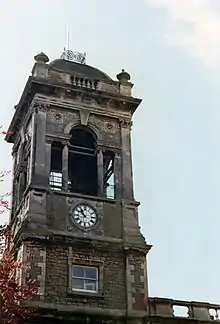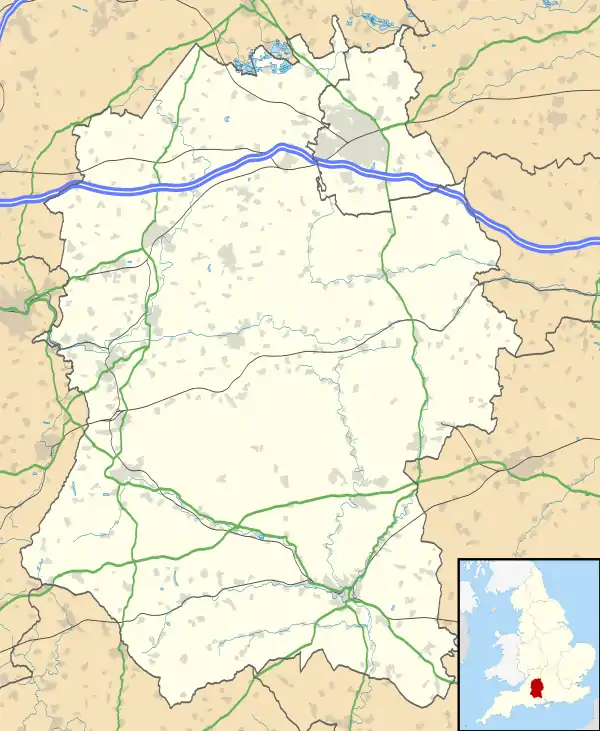Old Town Hall, Swindon
The Old Town Hall is a former municipal building of 1854 in the High Street, Swindon, Wiltshire, England. It is a Grade II listed building.[1]
| The Old Town Hall | |
|---|---|
 The tower in 1994 | |
| Location | Swindon |
| Coordinates | 51.5512°N 1.7731°W |
| Built | 1854 |
| Architect | Sampson Sage and E Robertson |
| Architectural style(s) | Neo-classical style |
Listed Building – Grade II | |
| Designated | 2 October 1951 |
| Reference no. | 1023523 |
 Shown in Wiltshire | |
History
Until the construction of the town hall on the High Street, the town council had met in the Goddard Arms on the High Street.[2] This small pub had been owned by the Goddard family since 1621 and was a small cottage alehouse known as the Crown until 1820.[2] The Goddard Arms was used for public meetings in the early 19th century and was used in this way by Ambrose Goddard to report progress on the Wilts & Berks Canal.[2]
The town hall, which was designed by Sampson Sage and E Robertson in the neo-classical style, was completed in 1854.[1][3] The main frontage has five bays separated by full-height Tuscan order pilasters, with arched windows on the ground floor, casement windows on the first floor and a pediment and roof lantern above.[1]
The building was extended to the northeast with a tower, as well as accommodation for a corn exchange at ground floor level, to the designs of Wilson and Willcox of Bath in 1866.[1] A wine store was built on an adjoining site and its upper hall was used as a magistrates' court from 1871 to 1891.[2]
After civic functions transferred to the new town hall in 1891, the building became a roller skating rink in 1910,[4] and a cinema known as the Rink in 1919. After the Second World War it was refurbished and re-opened as the Locarno Dance Hall.[4] Performers at the dance hall included the singer, Cilla Black, in April 1964,[5] followed by the rock bands, The Yardbirds in July 1964,[6] The Who in October 1965[6] and the Small Faces in November 1965.[7] The building subsequently served as a bingo hall but became vacant in the late 1970s.[8]
The building was acquired by bar owner, Gael Mackenzie, in 1999.[9] Major fires took place in the building in May 2003 and again in May 2004.[8] In November 2016, Swindon council entered into a development agreement with Swindon Corn Exchange Limited, a business managed by housebuilder, Steve Rosier, under which Rosier agreed to pursue a development on the site.[10] However, after no progress was made with the development and the building continued to decay, the council threatened to use a compulsory purchase order to re-acquire the property in January 2020.[11][12]
References
- Historic England. "Corn Exchange and Town Hall, Swindon (1023523)". National Heritage List for England. Retrieved 12 April 2020.
- Child, Mark (2002). Swindon : An Illustrated History. United Kingdom: Breedon Books Publishing. ISBN 1-85983-322-5.
- "Swindon Old Town Conservation Area Appraisal and Management Plan" (PDF). Swindon Council. p. 9. Retrieved 16 August 2020.
- "Locarno pictures bring back happy memories". Swindon Advertiser. Retrieved 12 April 2020.
- "Rock 'n' Roll Wiltshire". BBC. Retrieved 16 August 2020.
- "It's now or never for the Locarno". Swindon Advertiser. 28 September 2016. Retrieved 16 August 2020.
- "Were you at Small Faces' Locarno gig?". Swindon Advertiser. 23 November 2017. Retrieved 16 August 2020.
- "New hope for Locarno". Swindon Advertiser. 27 December 2005. Retrieved 12 April 2020.
- "Demolition plan for Swindon's Locarno listed building". BBC. 20 March 2012. Retrieved 16 August 2020.
- "Swindon's Corn Exchange and Old Town Hall saved as contracts are signed on regeneration project". Swindon Link. 10 November 2016. Retrieved 16 August 2020.
- "Swindon Borough Council issues Locarno threat". BBC. 22 January 2020. Retrieved 12 April 2020.
- "Swindon council pulls plug on deal to convert iconic Corn Exchange". Swindon Advertiser. 21 January 2020. Retrieved 16 August 2020.